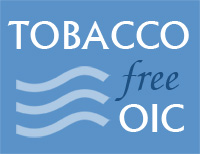What is “Tobacco Free OIC”?
 Tobacco Free OIC is an initiative developed by the Statistical Economic and Social Research and Training Centre for Islamic Countries (SESRIC) in response to the spread of tobacco epidemic in the OIC Member Countries. Over the years, Member Countries strived very hard to contain this epidemic by taking some measures like controlling tobacco production, banning advertisement in media and discouraging consumption by levying high taxes on tobacco products. However, despite all these noble efforts, tobacco epidemic is on rise and it is recognized as one of the leading causes of premature preventable deaths across the OIC region.
Tobacco Free OIC is an initiative developed by the Statistical Economic and Social Research and Training Centre for Islamic Countries (SESRIC) in response to the spread of tobacco epidemic in the OIC Member Countries. Over the years, Member Countries strived very hard to contain this epidemic by taking some measures like controlling tobacco production, banning advertisement in media and discouraging consumption by levying high taxes on tobacco products. However, despite all these noble efforts, tobacco epidemic is on rise and it is recognized as one of the leading causes of premature preventable deaths across the OIC region.
Against this back drop, Tobacco Free OIC initiative aims to foster an OIC-wide coordinated approach to curb and control the spread of tobacco epidemic in the OIC Member Countries. This initiative focuses on training and capacity building programs to facilitate the development and implementation of sustainable national tobacco control strategies in the OIC Member Countries.
Background
In 2007, SESRIC has presented a report on “Tobacco Control in OIC Member Countries” as a reference study to the First Islamic Conference of Health Ministers held on 12-15 June in Kuala Lumpur, Malaysia. Consequently, tobacco epidemic was identified as one of the greatest global health threats associated strongly with increased mortality from diseases such as cardiovascular diseases, cancer and respiratory diseases. The Conference urged the OIC Member Countries to:
- adopt the WHO Framework Convention on Tobacco Control (FCTC) to protect present and future generations from the devastating health, social, environmental and economic consequences of tobacco consumption and exposure to tobacco smoke;
- introduce Legislation as the core element for effective tobacco control;
- engage religious leaders to harness religious concepts against tobacco and substance use in prevention strategy;
- cooperate with the SESRIC and the IDB through suitable training programs on getting technical assistance for the implementation of effective and sustainable national tobacco control strategies and programs as well as for establishing appropriate legal framework in order to attain the vision embodied in the WHO – FCTC.